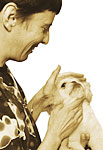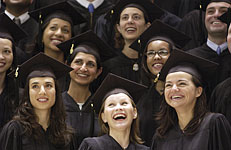Volume 26 · Number 1 · Fall 2008
100 Ways
that UC Davis Has Transformed the World
Veterinary medicine
Serving while learning.
UC Davis professional students make a difference every day in the lives of Californians — providing medical care at five free clinics for underserved populations; legal representation for low-income people on civil rights, family law, prisoner rights and immigration law; and veterinary care for the pets of the homeless. In addition, management students offer consulting service to business, government and nonprofit organizations.

Animal shelters.
As the number of dogs and cats housed at county animal shelters continues to skyrocket, so do the problems of keeping those animals healthy. A program that educates veterinarians in the “battlefield medicine” needed at shelters has led to cleaner cages, faster diagnoses and better training for shelter volunteers, resulting in healthier and more-adoptable kittens and puppies.
Oiled wildlife.
When an oil spill spreads over the surface of the ocean endangering birds and other small mammals, rescuers spring into action, thanks to a formidable network led by UC Davis wildlife veterinarians in conjunction with the California Department of Fish and Game. Injured animals are cleaned and rehabilitated at a dozen facilities stretching along the entire 1,100 miles of California’s coast.

Dairy improvements.
Better sanitation procedures, improvements in raw milk handling and quality, and innovations that have reduced the environmental impact of livestock waste have contributed to making California the nation’s largest dairy state. The J-5 vaccine alone, developed in 1988 by veterinary medicine faculty to prevent mastitis in dairy cattle, saves producers $11 million every year.

Cat lives.
The health and survival of domestic cats has been greatly improved, thanks to the development of a vaccine for feline leukemia, as well as research at UC Davis that linked a lack of dietary taurine, an amino acid, and feline dilated cardiomyopathy, a fatal heart ailment. The discovery convinced pet food companies to add taurine to commercial cat food, saving the lives of untold numbers of pets.

DNA analysis.
The Veterinary Genetics Laboratory, first established as a blood-typing lab to verify parentage for horse and cattle registries, has pioneered DNA-based verification in many species, providing pedigree validation, diagnostic tests and genetic research in large animals, pets and wildlife species. The lab’s analyses of crime-scene data have aided agencies worldwide in their investigations.
Beef cattle.
UC Davis’ wide-ranging research expertise in the area of beef cattle has revolutionized that industry. In 1947, animal scientist Max Kleiber pioneered a new understanding of cattle nutrition and metabolism that led the way for a more efficient feeding process. During the 1960s, researchers followed up on Kleiber’s work by creating the California Net Energy System, which further developed optimal cattle feeding methods. In recent years, computer modeling has shown how environmental conditions can help or hinder cattle growth.

Bluetongue eradication.
Bluetongue virus, a disease that has had a significant negative economic effect on the livestock industry, has been eradicated in parts of the United States, thanks to faculty research carried out at UC Davis for more than 30 years. Faculty members first characterized the disease in sheep, developed the first bluetongue diagnostic test and vaccine in the early 1960s, and led the way to finding safer, more effective vaccines.

Zoo medicine.
When zoo animals become ill or are injured, they benefit from the world’s first zoological medicine program, developed at UC Davis in conjunction with the Sacramento Zoo. The zoo became a learning laboratory for students and residents as faculty members developed new techniques to treat the animals and promote wildlife conservation.
Safeguarding your food.
Since the early 1900s, UC Davis and the field of food safety have grown up together. Today campus researchers from a variety of disciplines are conducting research, training students and informing the public about myriad food-safety challenges. UC Davis veterinarians help the California dairy industry prevent and detect microbial, anti-biotic and chemical contamination. Food, plant and veterinary researchers also have teamed up to better understand how a harmful strain of E. coli bacteria infected fresh spinach in 2007 and to prevent similar future contaminations. UC Davis researchers are also working with government and industry leaders to safeguard the state’s and nation’s food supplies against accidental or intentional contamination.
Cattle protection.
Cattle in Africa are being protected from rinderpest — a measles-like plague that has caused famine and economic devastation — thanks to a genetically engineered vaccine developed at UC Davis. Researchers at the International Laboratory of Molecular Biology for Tropical Diseases also produced an inexpensive diagnostic kit simple enough to be used in the field.

Disaster rescues.
When a natural disaster strikes, animals often become stranded and are at great risk of injury or death. A team of large-animal clinicians developed the first disaster plans to include animals and has deployed volunteers and provided expertise and support during the 1997 Northern California floods, Hurricane Floyd and Hurricane Katrina, and the 2006 Yolo County wildfires. The “Anderson sling,” developed by clinical faculty and staff, aids in the airlift recovery of horses and cattle and was used with renowned racehorse Barbaro following his devastating injury.
Bird flu.
When word of a deadly bird flu outbreak began circulating in late 2003, leading to fears of a pandemic and panicking citizenry, a team of UC Davis experts kept the public and veterinary professionals informed about H5N1 and its potential to spread to the human population. A wildlife health expert and a poultry veterinarian, along with two UC Davis physicians, devoted time to informing print and television media and developed a “Flu School” curriculum to update veterinarians, health officials and the general public in both the United States and abroad on avian influenza.

A world of alumni.
From the time the first students graduated in 1911, UC Davis alumni have been making their mark in the world — and beyond. Among their countless achievements are winning Olympic gold medals, directing Oscar-winning Disney films, heading UNICEF and flying through space as astronauts. With every year, the Aggie impact multiplies. From nine students in the 1911 class, our living alumni total has grown to 185,000.
« Return to 100 ways introduction

